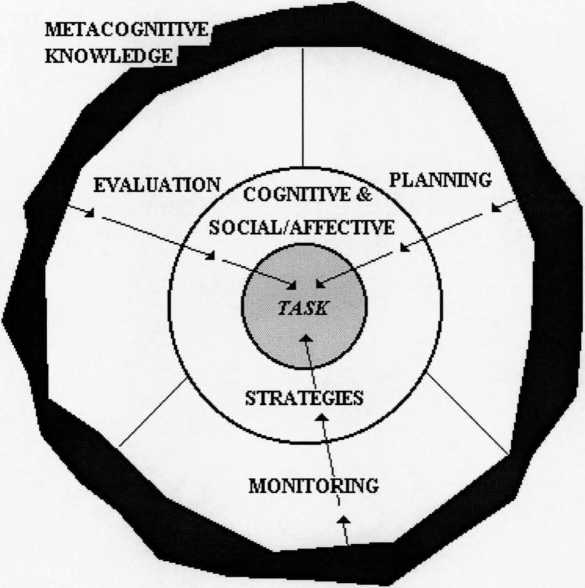strategies). After the instruction stage they practised planning, monitoring and evaluating.
The results of the research showed that subjects were able to understand the information they
received and start on their way to proceduralising it in order to develop metacognitive
strategies (34). This led me to support O'Malley and Chamofs statement that learners are
able to turn metacognitive knowledge into metacognitive strategies.

Fig. 3.3 Metacognitive knowledge and strategies scheme
3.3.2.3 Turning Hietacognitive knowledge into metacognitive strategies
However, the acquisition of metacognitive strategies is only possible under certain
specific conditions. Brown (1983, quoted by Wenden; 1987c, 159) mentions four specific
factors: explicitness of purpose, content, evaluation and integration.
Explicitness of purpose refers to the fact that instruction on metacognitive strategies
should be informed. Students are "not only instructed in the use of the strategy but also in
the need for it and its anticipated effects...together with the rationale to Ieam it" (Wenden,
ibid,160). For O'Malley and Chamot (1990), this is direct instruction of strategies which
58
More intriguing information
1. Behavior-Based Early Language Development on a Humanoid Robot2. From music student to professional: the process of transition
3. The name is absent
4. The name is absent
5. Language discrimination by human newborns and by cotton-top tamarin monkeys
6. TRADE NEGOTIATIONS AND THE FUTURE OF AMERICAN AGRICULTURE
7. Family, social security and social insurance: General remarks and the present discussion in Germany as a case study
8. The name is absent
9. Place of Work and Place of Residence: Informal Hiring Networks and Labor Market Outcomes
10. The Shepherd Sinfonia